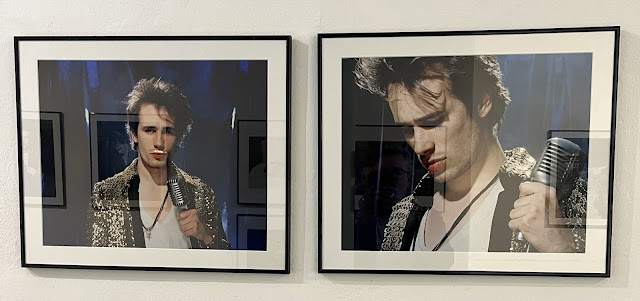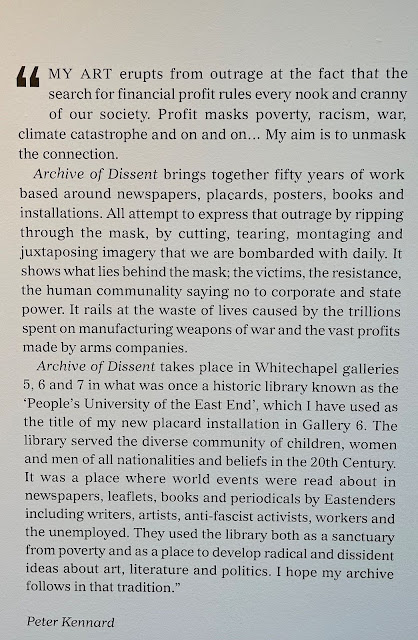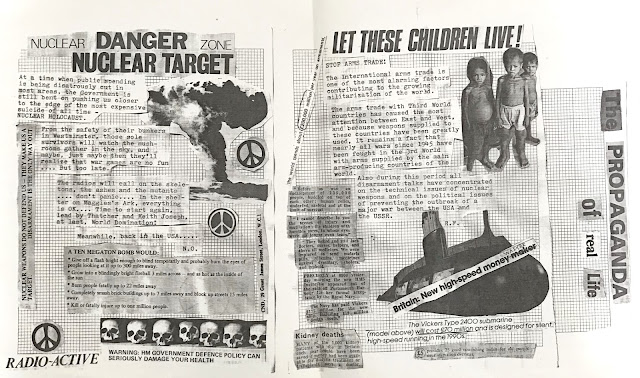Not sure how many folk music revivals we have had now, of course it's never really gone away but I am enjoying the latest queer friendly iteration with the likes of Shovel Dance Collective and Goblin Band. Have seen the former's Jacken Elswyth and Mataio Austin Dean performing solo at the Goose is Out folk night in Nunhead, likewise Sonny Brazil of the latter. And Broadside Hacks used to do a session at pub in my road in SE14.
The Broadside Hack (Live from Real World) 2022 is the soundtrack to a short film that includes some interesting reflections on the politics of folk song. In a 'collective authoring of history' interview, members of Shovel Dance describe how 'Folk music's kind of like an act of solidarity across time I think… a real kind of genuine act of sharing across hundreds of years and millions of people... A different kind of history than what you get from mainstream history, from capitalist history if you will, it's a kind of intergenerational, intertemporal collective authoring of history'. Similarly Thryis discuss how 'We place ourselves within this greater chain of history by playing these songs, we're figuring ourselves within this collective narrative...There's this sort of collaboration across space and time, you are engaging with other musicians from other times that you’ve never met and yet you feel like perhaps you have something of an intimate relationship with them, I like that sort of distanced intimacy'. Naima Bock says 'it’s a kind of history of people that have no voice so it’s a beautiful and poetic way of hearing people from the past who you wouldn’t otherwise have heard'.
Goblin Band have made similar reflections, with Rowan from the band telling tradfolk in a 2024 interview: 'folk music is the history of us. It’s the history of our country, of our land, of our communities, in a way that is outside of the history books. That is a political thing. Everything that is chronicled in folk music is a reflection of a political story'.
Ewan MacColl and the Critics Group
Echoes here of Ewan MacColl who used to tell the Critics Group of folk singers meeting at he and Peggy Seeger's Beckenham home in the 1960s: 'I find it necessary to close my eyes and shut the audience out, and to identify, either with some character in the song, or with the kind of person I think may have originally sung the song, or even may have created the song. This means that you have to equip yourself with a fair amount of the data about the period in which the song was created ... say this song was perhaps written in 1736, written by a ploughman in Dorset. What was it like? I wonder what it felt for a bloke like that to create a song like this, and all the other people who contributed to the song later. All the other men and women who polished it over generations.. suddenly you find yourself filled with an extraordinary sense of compassion and respect for all those people who went before. And suddenly you find yourself in the tradition - you're with them. And at that moment you also disappear in a strange way, and the song really takes over ... the audience comes with you' (quoted in Ben Harker, Class Act: The Cultural and Political Life of Ewan MacColl, 2007).
Folk singing here is a historical method, a form of 'history from below' of the kind pioneered by E.P. Thompson as famously stated in the preface to 'The Making of the English Working Class' (1963): 'I am seeking to rescue the poor stockinger, the Luddite cropper, the ‘obsolete’ hand-loom weaver, the ‘utopian’ artisan, and even the deluded follower of Joanna Southcott, from the enormous condescension of posterity.” Thompson's approach was characterised by his fellow radical historian Raphael Samuel as a form of 'resurrectionism', an attempt 'to give a voice to the voiceless and speak to the fallen dead' (Theatres of Memory, 1994).
The community with the dead
For Walter Benjamin, remembrance was not an act of passive contemplation but a motor of radical change. For him the 'enslaved class' has to be 'the avenger that completes the task of liberation in the name of generations of the downtrodden' (On the concept of history, 1940), giving a redemptive voice to those who came before. As Michael Löwy summarises it in his 'Fire Alarm: Reading Walter Benjamin’s ‘On the Concept of History' (2005), ' It is clear the remembrance of victims is not, for him, either a melancholic jeremiad or a mystical meditation. It has meaning only if it becomes a source of moral and spiritual energy for those in struggle today... During a conversation with Brecht on the crimes of the Nazis in 1938, Benjamin notes: ‘While he was speaking like this I felt a power being exercised over me which was equal in strength to the power of fascism, a power that sprang from depths of history no less deep than the power of the fascists.’ Or again from Löwy: 'the last enslaved class, the proletariat, should perceive itself as heir to several centuries or millennia of struggle, to the lost battles of the slaves, serfs, peasants and artisans. The accumulated force of these endeavours becomes the explosive material with which the present emancipatory class will be able to interrupt the continuity of oppression'.
The radical theologian Jürgen Moltmann (1926-2024) was influenced by Benjamin and the Frankfurt School. He wrote of 'The community with the dead... We suffer almost dumbly under the unreconciled hurts of the past. But we hardly perceive any more the sufferings of the dead which cannot be made good. A wall of silence, hard to break through, has been built up between us and the dead. Who feels the silent protest of the dead against the indifference of the living? Who is still conscious that the dead cannot rest as long as they have not received justice?... Are the murderers to triumph irrevocably over their victims? Can their death be their end? 'Theology', said Max Horkheimer at that time, 'is the hope ... that injustice will not be the last word. [It is] the expression of a longing, a longing that the murderer may not triumph over the innocent victim. ' It is profoundly inhumane to push away the question about the life of the dead. The person who forgets the rights of the dead will be indifferent towards the life of his or her children too' (The Coming of God, 1996).
It is not necessary to believe in a literal afterlife to recognise that the dead have a presence, not least in our language and our music (though of course in many spiritual traditions engagement with the ancestors is central). Isn't the singer of old songs of the downtrodden and apparently defeated resisting this indifference of the living to the dead and drawing on the power of the ancestors? I like to think so.
Neil Transpontine, October 2024
Update December 2024: Dan Hancox (writing at his Honor Oak Riot substack) has had some similar thoughts in relation to Lankum, giving as an example their song 'Hunting the Wren' and its telling of the story of the Curragh Wrens, a marginalised community of poor women in 19th century Ireland. He notes 'Benjamin writes: in fact, our greatest hope of emancipation will come not from utopian dreams of liberated grandchildren, but from saving our oppressed ancestors from obscurity, and bringing them out into the light. All of which is to say: Lankum are absolutely doing Benjamin’s work here, bringing the story of the Curragh Wrens out into the light' (Sharp is the Wind, December 2024),
Update March 2025: Finally got to see Goblin Band at the Ivy House back in January and yes they were great! Also came across a great Jacques Derrida quote: 'no ethics, no politics, whether revolutionary or not, seems possible and thinkable and just that does not recognize in its principle the respect for those others who are no longer or for those others who are not yet there, presently living, whether they are already dead or not yet born' (Specters of Marx).




.JPEG)
















.JPEG)






















.JPEG)


.jpg)


